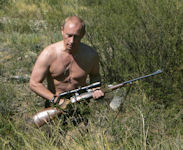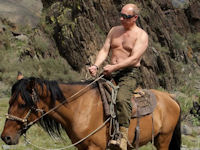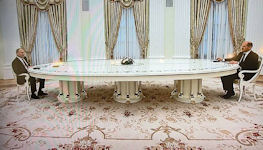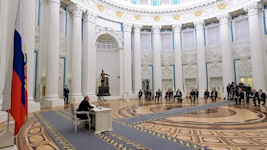Vladimir Vladimirovich Putin - Health
 For years, the Kremlin has kept tight-lipped about the state of Russian President Vladimir Putin's health, prompting journalists and political scientists to analyze the president's every move in attempts to detect any sign of frailty or illness. Rumors claiming Putin has thyroid cancer, serious back problems and even psychosis became part of the regular discourse surrounding the president.
For years, the Kremlin has kept tight-lipped about the state of Russian President Vladimir Putin's health, prompting journalists and political scientists to analyze the president's every move in attempts to detect any sign of frailty or illness. Rumors claiming Putin has thyroid cancer, serious back problems and even psychosis became part of the regular discourse surrounding the president.
Vladimir Putin can work for days on end, presidential spokesman Dmitry Peskov said 24 April 2023. “If you, for example, work under Putin, he has some fantastic capacity for work. And therefore, if you cannot keep up with him, then you cannot work with him,” he said at the Knowledge.First marathon. "You see what kind of president we have. He, in fact, as he was, is mega-active. With difficulty we keep up with him - those who work next to him. His energy can only be envied. His health, God forbid, you can wish for yourself himself. Of course, he did not sit in any bunkers. This is also a lie," Peskov explained.
Putin spoke 07 November 2024 at the annual plenary session of the Valdai Club. His speech, including answers to questions, lasted more than four hours. After Putin's speech, many people began to talk about problems with his eyesight or speech. At the Valdai Discussion Club session, during his hour-long speech, he misspoke, stammered, and mispronounced words more than forty times while reading from a piece of paper.
Vladimir Putin’s media depictions act as a personification of the Russian nation and state. Putin has tried to maintain the image of a physically strong, decisive leader who can be counted on to solve challenging problems. This personification includes the physical appearance (e.g., masculinity and strength) and the health of the leader, which represents the country’s health and strength. This is in contrast to the physical fragility of geriatric Soviet leaders during the period of stagnation towards the end of the Cold War, and the increasingly precarious health of Boris Yeltsin in the later 1990s. Both periods corresponded with the political weakness of the Soviet state itself.
Putin drew heavily on projections of gendered power to maximise the effect of securitisation moves and to mobilise diverse gendered narratives, imageries, and practices to construct the meaning of threats. These performances of securitisation set standards of appropriateness and legitimise certain kinds of foreign policy responses while silencing others or presenting them as weak and ineffective. Such gendered discursive practices enable the move from ‘normal’ politics to the domain of emergency and exception or, as Andreas Kalyvas puts it, to the ‘politics of the extraordinary’.
As Charlotte Hooper emphasises, ‘it is a commonplace observation that international relations reflect a world of men in that they influence international affairs through their physical capacities, through (masculinist) practices at the institutional level, and through the symbolic links between masculinity and power’. National leaders actualise and perform hegemonic masculinities to convince audiences at home and abroad that they are able to combat a threat. Putin drew on the idealised heteronormative concept of the nuclear family to frame himself as the nation's patriarch and legitimise his authoritarian regime.
When it comes to Putin’s health, the Russian media portrayed him as a healthy person, though avoided from substantiating this statement with medical information such as medical examination results (e.g., blood pressure or cholesterol). A case in point, when Putin was asked by reporters about his health, and he responded that “everything was in order with his health, [and this] was due to his regular engagement in sport activities. ‘Like everyone else, there may be some flu or something else in the offseason, but today everything is in order,’” (Izvestia [IZ], 20 December 2018).
Russian newspapers depicted Putin as a health-promoting role model. The main emphasis of Putin’s health was comprised of sports activities. The Russian president appeared regularly in sport activities in which he personally took part. For instance, newspapers reported Putin playing hockey, as well as participating in martial arts matches and skiing. Specifically, during a hockey game Putin played, he humorously remarked: “‘I will strive to ensure that you [the other team] look decent [in the match].’” The article later recounted this did not happen: “[Putin] did not keep his promise” the article read“[since] at the beginning of the match he [immediately] shot the puck into the net...” (Komsomolskaya Pravda [KP], 23 September 2019).
“Putin is known for his passion for various sports. The President, in particular, plays hockey, skis, and engages in judo and swimming” (IZ, 10 October, 2019); “Putin is known for his passion playing various sports, in particular, [he] plays hockey, and engages in judo and swimming. Likewise on February 13, the Russian leader went skiing in Sochi with Lukashenko” (IZ, 12 March, 2019); “[after] the Russian president spoke with the [Russian] national teams in freestyle wrestling, boxing and judo, he changed into their apparel and trained with the athletes” (IZ, 10 October, 2019).
The newspapers also tended to recount Putin’s past sports activities: “‘I learned to skate with a chair, by setting the chair in front of me,’ [Putin] recalled” (KP, 12 May, 2019); “The first sport I practiced was boxing, [and I remember] my nose was broken [by my opponent]” (IZ, 10 October, 2019).
Putin was also portrayed as a nature enthusiast and enjoying the outdoors. These activities are known to promote relaxation and advance positive mental health (Barton and Pretty 2010): “‘I went hiking two days ago” the president said, “I walked almost nine kilometers through the mountains and everything still hurts,’” (KP, 07 October, 2019); “the president [Putin] has repeatedly said that Russia is a vast, beautiful and rich country... [and therefore] Putin’s task as head of state is to lead by example and to popularize places [in nature] that “‘most citizens don’t know exist’” (IZ, 13 October, 2019).
President Putin’s social media messaging in the context of health habits was in accordance with his portrayal by the traditional media. Putin shared through his Facebook page videos and pictures of himself participating in diverse sport activities such as boxing, hiking and horse riding.
In November 2012 news reports in Japan said Prime Minister Yoshihiko Noda had postponed a meeting with Russian President Vladimir Putin next month because of the Russian leader's poor health. Japan's Kyodo and Jiji newspapers reported that the mayor of a northern Japanese town told Noda Friday that Putin's health condition is bad. However, the Kremlin denied the reports, with Putin's spokesman, Dmitriy Peskov saying the president's health problems have been exaggerated. Peskov has denied that Putin is suffering back problems from a sports injury. The spokesman said that since a meeting between the two leaders had not been officially scheduled, there should be no talk about a postponement.
In May 2015 Putin had not been seen in public for at least a week, fueling speculations about his health. Social media users have flooded the Internet with assertions -- serious and humorous -- that Putin had died. His press secretary, Dmitry Peskov, has dismissed those reports as nothing more than "spring fever." Social media headlines reporting allegations from the Russian Internet that Putin is dead prompted the mainstream media worldwide to speculate about the Russian president's state of health.
The Russian president has always appeared overly sensitive about his health — a contradiction to the derring-do physical feats Putin likes to be filmed doing. Howard Hughes set the standard for today's hypochondriac celebrities' tics and reclusion. The grim scenography of Hughes's decline, combined with elaborate prophylactic rituals against the outside world, is a warning about the potential price of power. Hypochondria is a persistent fear or belief that one has a serious, undiagnosed medical illness. Individuals suffering from severe anxiety are at a higher risk of developing the condition.
Even before the onset of the coronavirus pandemic, Putin was once filmed hectoring ministers for coughing, demanding to know why they had come when sick. In November 2019, he upbraided his entire cabinet when discovering only three had been vaccinated against flu. "Three people, or four if you count me," he said. "Getting the flu is self-harm. You could have prevented it, but you didn't," the Russian leader snapped.
Putin took far more stringent precautions than most of his global counterparts to prevent getting the coronavirus. Kremlin spokesmen Dmitry Peskov confirmed in June 2020 that anyone wanting to see the Russian president has to walk through a futuristic "disinfection tunnel," where they're sprayed with an aerosol mist. In April, it was confirmed that anyone wanting to see Putin has to undergo a test for the virus beforehand. The chamber, manufactured by a company in the Russian town of Penza, was installed in Putin's country dacha in the town of Novo-Ogaryovo, west of Moscow, where the Russian leader retreated virtually full time after some of his officials tested positive for the coronavirus, including Prime Minister Mikhail Mishustin and Peskov.
Frederick Coolidge, a professor at the University of Colorado who has studied the personality traits of autocratic leaders. "They tend to have an excessive fear of death or infection," he said. "They fear losing control, they fear losing everything and have a need to control everything," he added. "And they are not always rational about it." It is not unusual to be worried about germs and to do what one can to stave off infections, but the lengths the germaphobe Russian president has been taking to avoid contracting the virus prompt comparisons with past autocrats, Coolidge said.
In his 2003 book Stalin: The Court of the Red Tsar, historian Simon Sebag Montefiore described the communist dictator among other things as "a fidgety hypochondriac suffering from chronic tonsillitis, psoriasis, rheumatic aches from his deformed arm and the iciness of his Siberian exile." His hypochondria and fear of death — whether from natural causes or otherwise — drove in part the infamous 1952 "Doctors' Plot" the year before his death, when a group of Jewish Moscow doctors were rounded up and accused of plotting to kill him. Germany's 19th-century strongman, Otto von Bismarck, was also excessively worried about his health and suffered from hypochondria — opposition to his "sovereign will," whether in human form or in the form of germs, he found intolerable, according to his biographer, Jonathan Steinberg.
Ugandan autocrat Idi Amin reacted with fury when a son fell ill with a stomach ailment. His immediate thought was the boy had been poisoned. Storming into the palace kitchens, he put a gun to the head of the first chef he saw and threatened, "If the kid dies, I'm going to kill all of you," according to a cook interviewed by Polish journalist Witold Szablowski for his recently published book, How to Feed a Dictator.
One former Kremlin official dismisses the comparisons and says as head of state, all means should be employed to protect Putin. "Better that," he said, than following the example of Britain's Boris Johnson. "He was blasé, shaking hands with everyone, and look what nearly befell him." In April 2020, Johnson said he nearly died after developing COVID-19, the disease caused by the coronavirus.
Some sought a medical explanation for Putin's surprisingly misguided decision to invade Ukraine in February 2022. The "analysis" of Putin’s health is largely “speculation” given the Kremlin’s control on all information regarding the Russian leader. Putin requires those meeting him in-person to quarantine for two weeks and opts to use absurdly long tables to keep people at a great distance from himself in public appearances. Putin’s decision to physically isolate himself from guests as a sign of a fear of ‘co-morbidities’ leaving him open to infections. People who are taking immune-suppressing medication, such as cancer patients or those with chronic conditions, are known to be at a higher risk of contracting a severe case of Covid.
Western intelligence sources reportedly suggested Putin could be suffering with cancer, Parkinson's disease or dementia. The 69-year-old leader's 'bloated face and neck' could be potential side effects of prolonged use of steroids. There are theories that Putin is either suffering from a brain condition, such as Parkinson’s disease or a more generic form of dementia, or that he has cancer and the medical treatment he is receiving has altered the balance of his mind.
Fiona Hill, the British former senior White House expert on Russia, told Politico: "Putin’s not looking so great, he’s been rather puffy-faced. We know that he has complained about having back issues." She added: "Even if it’s not something worse than that, it could be that he’s taking high doses of steroids, or there may be something else. There seems to be an urgency for this that may be also driven by personal factors."
Sir Richard Dearlove, who headed up the UK secret service MI6 from 1999 until 2004, told GB news “Maybe Putin’s behaviour - maybe his rationality - is prejudiced or compromised by illness. The best explanation, that we don’t know whether it’s correct or not, is that he may have Parkinson’s. That certainly I’ve heard from several neurologists who say that loss of restraint, psychosis, are very common Parkinson’s symptoms."
Retired Royal Navy Admiral Chris Parry said that he believed President Putin could be battling cancer, and suggested it could be making him a “man in a hurry” to invade Ukraine. Valery Solovei, political scientist and former head of the Public Relations Department at Moscow State Institute of International Relations, previously claimed Putin has cancer as well as symptoms of Parkinson’s Disease.
Putin was shown tightly gripping a table during a 12-minute video clip of a meeting with Russian defense minister Sergei Shoigu. He tapped his foot and slouched throughout the course of the clip, which was released by the Russian government late last week. His face was noticeably bloated. The video prompted some online commentators, including former UK Conservative Party parliamentarian Louise Mensch, to draw the conclusion on Twitter that the Russian president has Parkinson's disease. The claim has also been reported by a number of UK tabloids. The stories featured comments from a professor of strategic communications, a couple of political analysts and a professor of body language.
Parkinson's disease and parkinsonism are incredibly difficult to diagnose and can only be determined by thorough neurological examination in person. Parkinson's is a complex condition with over 40 symptoms ranging from physical to mental, and it is therefore impossible to diagnose via a 12-minute video clip. It affects everyone differently. With no definitive diagnostic test, it's something that can only be confirmed after examination by a neurologist or specialist.
Russian President Vladimir Putin’s private chat about organ transplants and immortality with his Chinese counterpart Xi Jinping, captured by a “hot mic” during a military parade in Beijing on 03 September 2025, focused attention on a longtime obsession of the strongman in the Kremlin, who has made the development of “anti-ageing technologies” a national priority. The Chinese and Russian leaders, both 72, had not expressed any intention of stepping down. Xi's translator, conveying his remarks to Putin, is then heard in Russian quoting a line from a Tang dynasty poem: "In the past, it used to be rare for someone to be older than 70 and these days they say that at 70 one's still a child."
"With the ... development of biotechnology, human organs can be continuously transplanted, people could get younger as they grow older, and may even become immortal," Putin said, according to the translator. Xi then spoke again in Mandarin as the camera cut away: "Predictions are, in this century, it may be ... possible to live to 150 years old."
|
NEWSLETTER
|
| Join the GlobalSecurity.org mailing list |
|
|
|






